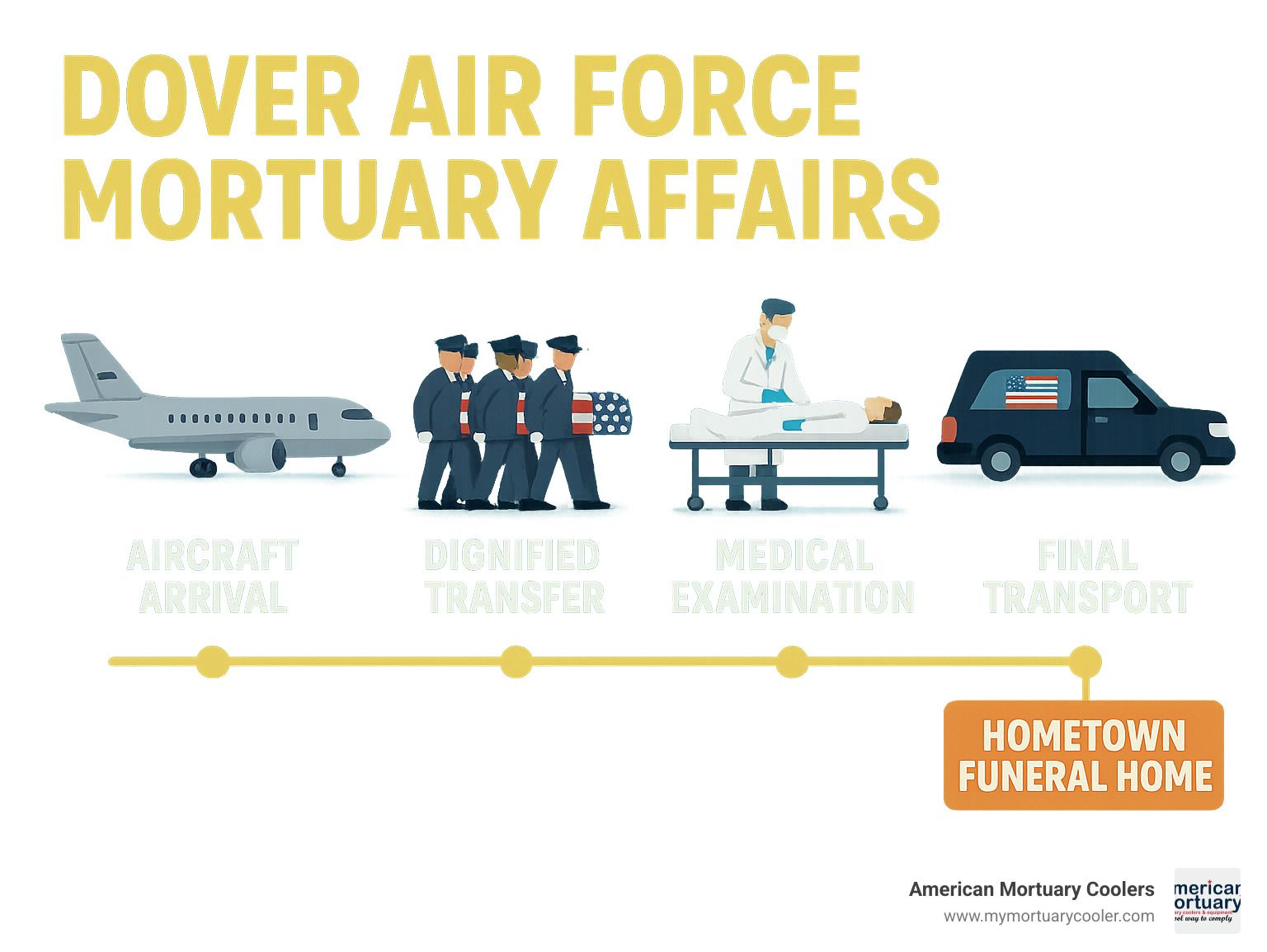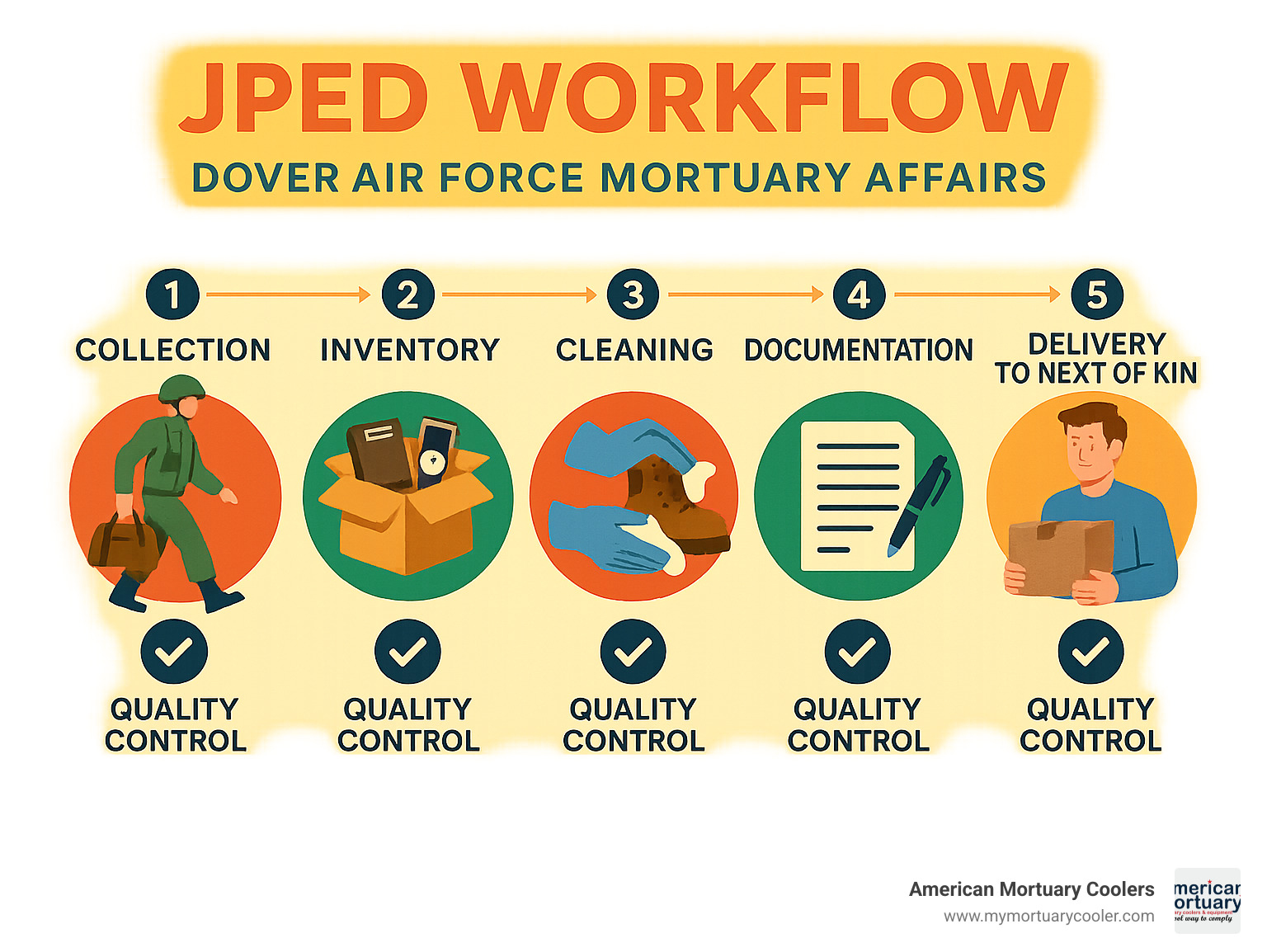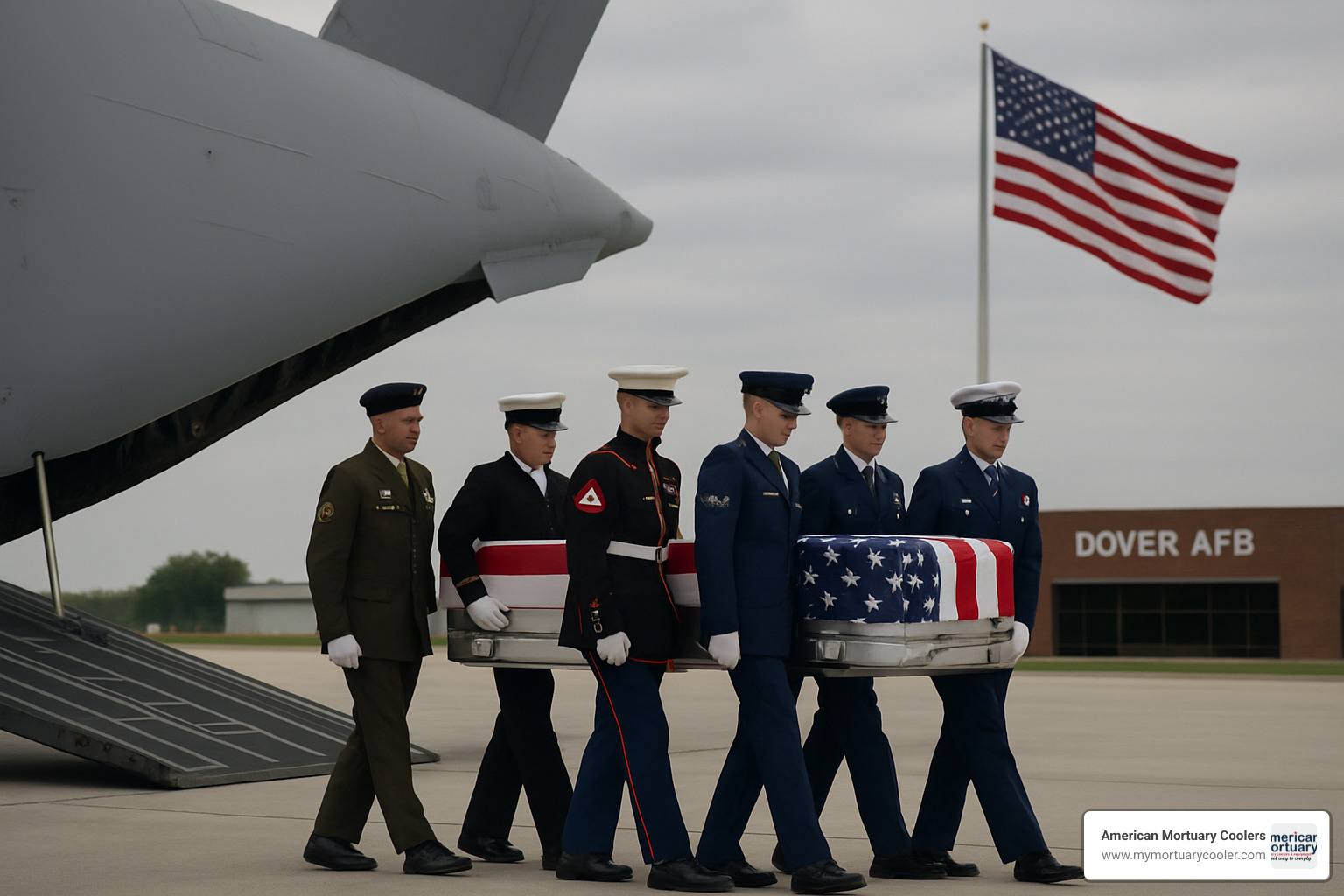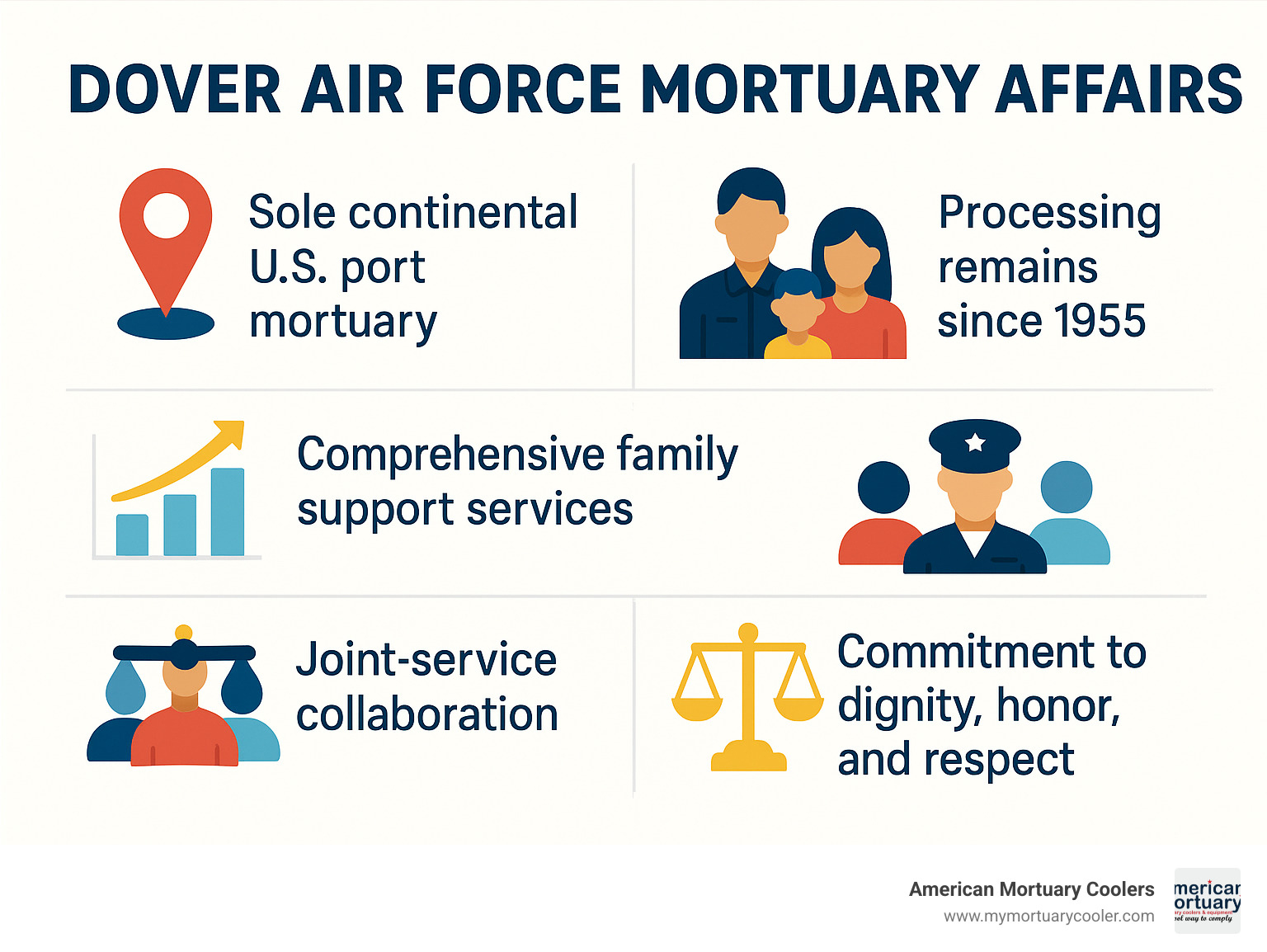Why Dover Air Force Mortuary Affairs Serves as America's Gateway Home
Dover Air Force Mortuary Affairs represents the nation's most sacred commitment to our fallen service members. Located at Dover Air Force Base in Delaware, this facility serves as the sole continental United States port mortuary for the Department of Defense.
Key Facts About Dover Air Force Mortuary Affairs:
- Location: Charles C. Carson Center for Mortuary Affairs, Dover AFB, Delaware
- Size: 70,000 square feet, $30 million facility built in 2003
- Mission: Dignified transfer, identification, and preparation of fallen service members
- Scope: Processes remains from all military branches and handles personal effects
- History: Operating since 1955, processed over 50,000 service members
- Notable Cases: Handled victims from Jonestown, Challenger, Columbia, and 9/11 attacks
The motto "Dignity, Honor and Respect" guides every action at this facility. From the moment a flag-draped case arrives on the flightline to the final preparation for burial, highly trained teams ensure each fallen hero receives the utmost care.
Dover's mortuary operations combine multiple specialized units under one roof. The Air Force Mortuary Affairs Operations (AFMAO) works alongside the Armed Forces Medical Examiner System (AFMES) and Joint Personal Effects Depot (JPED). Together, they provide comprehensive services to families during their most difficult moments.
As American Mortuary Coolers, a national level mortuary cooler supplier, we've worked extensively with facilities handling sensitive operations similar to Dover Air Force Mortuary Affairs. Our experience with mortuary equipment and preservation systems gives us unique insight into the critical infrastructure that supports these solemn missions.

Key Dover Air Force Mortuary Affairs vocabulary:
Dover Air Force Mortuary Affairs: Mission, Location & History
The Dover Air Force Mortuary Affairs facility stands as a testament to America's unwavering commitment to its fallen heroes. Located at Dover Air Force Base in Delaware, the Air Force Mortuary Affairs Operations (AFMAO) operates as a Field Operating Agency directly under Headquarters Air Force.
This isn't just any military facility – it's the largest mortuary under the Department of Defense and the only DoD mortuary located within the continental United States. The Charles C. Carson Center for Mortuary Affairs houses this sacred mission in a 70,000 square foot facility that cost $30 million to construct.
When the doors opened in November 2003, this state-of-the-art building replaced a facility that had served faithfully for 48 years. The facility maintains 24/7 alert status, ready to receive incoming repatriation flights at any hour. According to Scientific research on AFMAO mission, AFMAO's mission is clear: "fulfill our nation's sacred commitment of ensuring dignity, honor and respect to the fallen."
Since its establishment, Dover Air Force Mortuary Affairs has processed the remains of over 50,000 service members. More than 6,800 U.S. military personnel and American civilians killed in Iraq and Afghanistan have passed through these halls since September 11, 2001.
How Dover Air Force Mortuary Affairs Operations Began
The story of Dover Air Force Mortuary Affairs begins in 1955, when the Port Mortuary was first established at Dover Air Force Base. The facility's creation came from handling repatriations from the Korean War with the dignity and respect America's heroes deserved.
As the Vietnam War escalated, Dover's role expanded significantly. The facility processed thousands of service members who made the ultimate sacrifice in Southeast Asia, establishing the protocols and traditions that continue today.
Dover's mission extended beyond military casualties during several tragic events. In 1978, the facility processed victims of the Jonestown mass murder-suicide in Guyana. The facility later handled the remains of the Space Shuttle Challenger crew in 1986 and the Columbia crew in 2003.
Following September 11, 2001, Dover Air Force Mortuary Affairs processed military personnel killed in the Pentagon attack. This marked the beginning of two decades of continuous operations supporting the Global War on Terror.
A significant milestone occurred in 2001 when Dover became the sole continental U.S. port mortuary after operations at Oakland Army Base in California ceased.
The Evolving Role of Dover Air Force Mortuary Affairs Today
Modern Dover Air Force Mortuary Affairs operations represent a remarkable evolution from the facility's humble beginnings in 1955. Today's AFMAO operates as a comprehensive mortuary affairs organization with truly global reach.
The organization has expanded by deploying contingency response teams to Europe in 2010, the Pacific in 2019, and Japan in 2020. These forward-deployed capabilities ensure rapid response to incidents involving American service members worldwide.
Organizational changes reflect the military's growing recognition of mortuary affairs as a critical mission. In 2008, Air Force Mortuary Affairs Operations took control of the facility. In 2014, AFMAO became a Field Operating Agency directly under Headquarters Air Force.
| Capability | 1955 Operations | 2024 Operations |
|---|---|---|
| Facility Size | Original building | 70,000 sq ft, $30 million facility |
| Geographic Scope | Korean War repatriations | Global contingency operations |
| Technology | Basic embalming/preparation | DNA identification, forensic analysis |
| Staff Composition | Military personnel only | Joint military-civilian teams |
| Processing Capacity | Limited throughput | High-volume surge capability |
| Family Services | Minimal support | Comprehensive family campus |
Today's operations integrate cutting-edge forensic technology and DNA identification capabilities. The facility now stocks every badge, patch, ribbon, and decoration used by all five military branches to ensure accurate uniform assembly for each fallen service member.
Modern Dover recognizes that caring for families is just as important as caring for the fallen – a philosophy that guides every aspect of the mission.
From Flightline to Final Salute: The Dignified Transfer & Preparation Process
When a military aircraft carrying fallen heroes touches down at Dover Air Force Base, something sacred begins. The dignified transfer process marks the first step in America's final salute to those who gave everything for their country.
Arrival protocol at Dover Air Force Mortuary Affairs follows precise choreography that honors each service member. Specially trained carry teams composed of personnel from the same military branch move with deliberate grace. They transfer each flag-draped case from the aircraft with movements that speak louder than words about respect and dignity.
These ceremonies happen regardless of weather or time of day. Since 2009, families have been able to witness this solemn moment, providing them with closure and the knowledge that their loved one's final journey began with honor.
Once the dignified transfer concludes, the Armed Forces Medical Examiner System (AFMES) takes over for the crucial identification process. Using DNA analysis, dental records, and fingerprints, medical examiners ensure absolute certainty in identification.
The condition of remains determines the next steps in preparation. Medical examiners classify each case as either viewable or unviewable based on the extent of injuries sustained. When remains are deemed unviewable, specially trained chaplains and family liaisons handle these difficult conversations with extraordinary compassion.
Embalming procedures and preparation work require meticulous attention to detail. For viewable remains, the process becomes an art form of respect. Every step honors the service member's sacrifice while preparing them for their final journey home.
The facility's uniform shop represents one of the most touching aspects of the preparation process. Staff members assemble each service member's dress uniform according to exact military specifications. Every crease must be razor-sharp, every medal positioned perfectly. The facility stocks badges, patches, ribbons, and decorations from all five military branches to ensure complete accuracy.
As one staff member beautifully expressed: "Preparing each uniform is a final product and a way of saying thanks to those who gave the ultimate sacrifice." This attention to detail transforms uniform assembly into a final act of service.
Flag pressing completes the uniform preparation process. Each American flag receives careful pressing to ensure it drapes perfectly over the casket.

Throughout this process, specialized morgue equipment maintains proper preservation. Temperature-controlled storage systems operating between 36°F and 39°F ensure remains stay perfectly preserved while families make their final arrangements.
Suicide cases present unique challenges that require special sensitivity. Staff receive specialized training to address these situations with the same dignity given to combat deaths. Whether a service member died in combat, an accident, or by suicide, Dover Air Force Mortuary Affairs treats each with identical respect and care.
Caring for Families & Personal Effects
When families arrive at Dover Air Force Mortuary Affairs, they're entering one of the most difficult chapters of their lives. The facility understands this profound responsibility and has created something truly special: the Campus for the Families of the Fallen.
This dedicated space goes far beyond basic accommodations. The Fisher House provides free lodging where families can stay as long as needed, while the meditation pavilion offers a quiet sanctuary for prayer and reflection. These aren't just buildings - they're havens where grieving families can find moments of peace amid their sorrow.
Family liaison officers serve as gentle guides through this overwhelming process. Many of these officers have military backgrounds themselves, bringing both professional expertise and personal understanding to their role. They walk alongside families every step of the way, respecting each family's unique wishes and cultural traditions.
The spiritual care at Dover feels deeply personal. Major Darren Schwartz and his chaplain team provide comfort to families of all faiths - or no faith at all. They understand that grief looks different for everyone, whether it's through prayer, quiet conversation, or simply sitting in supportive silence.
Small touches make a big difference during these dark days. The facility keeps chocolates and mints on hand for families, coordinates meals through the on-base hotel, and handles countless logistical details so families can focus on what matters most: honoring their loved one.
The Joint Personal Effects Depot (JPED) handles one of the most emotionally charged aspects of the entire operation - returning personal belongings. Established after September 11, 2001, JPED moved to a $17.5 million facility at Dover AFB in 2011. What once took weeks now takes just days, thanks to direct shipment from overseas operations.
The body refrigeration systems throughout the facility maintain precise preservation conditions while families make their final arrangements. These systems operate around the clock, ensuring optimal care during this critical time.
Service-specific liaison officers at JPED bring remarkable attention to detail. Marine liaisons, for example, understand the deep significance of items like shark's tooth attachments within Marine Corps culture. This isn't just processing belongings - it's honoring the unique traditions that made each service member who they were.

Transportation support removes another burden from grieving families. Staff members coordinate flights from major airports including Philadelphia and Baltimore, ensuring families can attend dignified transfer ceremonies without worrying about travel logistics.
Every aspect of family care at Dover Air Force Mortuary Affairs reflects a simple truth: behind every flag-draped case is a family whose world has been forever changed. The facility's commitment to dignity, honor, and respect extends fully to these families, creating space for healing even in the midst of profound loss.
People Behind the Mission: Joint Collaboration & Resilience
Behind every dignified transfer at Dover Air Force Mortuary Affairs stands a remarkable team of dedicated professionals who've chosen one of the military's most challenging missions. These men and women work together across service lines, creating something truly special in how America honors its fallen heroes.
The facility operates with a unique blend of military precision and civilian continuity. Over 30 civilian employees provide the backbone of operations, maintaining institutional knowledge even as military personnel rotate to new assignments.
What makes Dover truly special is how different military branches work together seamlessly. Army, Navy, Marine Corps, Air Force, and Coast Guard personnel collaborate daily, each bringing their service's distinct traditions and expertise. When a fallen Marine arrives, Marines perform the carry. When it's a sailor, Navy personnel take the lead.

The Honor Guard graduation ceremonies showcase how seriously Dover takes ceremonial training. Personnel spend countless hours perfecting flag handling, learning uniform regulations for all services, and practicing dignified transfer procedures.
Working at Dover Air Force Mortuary Affairs demands extraordinary emotional resilience. Staff members face the reality of death daily, often involving service members younger than themselves. The psychological weight of this mission requires careful attention to mental health and wellbeing.
The facility has developed comprehensive resiliency programs recognizing these unique challenges. Group meetings provide safe spaces for staff to process difficult cases. Spin classes and social events help build camaraderie and stress relief. Research on occupational stress shows that professionals in death-related fields face higher risks of burnout and secondary trauma, making these support systems essential.
Staff members often describe their work as emotionally demanding yet deeply meaningful. As one major shared, "This mission is the most purposeful of any in my 16 years of service."
Training emphasizes treating every case with equal dignity, regardless of how death occurred. This consistency ensures that every family experiences the same level of compassion and professionalism during their darkest hours.
High-Profile Cases, Controversies & Continuous Improvement
Dover Air Force Mortuary Affairs has handled numerous high-profile cases that have shaped both its operations and public perception. The facility processed remains from the September 11, 2001 Pentagon attack, demonstrating its capability to handle mass casualty events with dignity and precision.
However, the facility faced its greatest challenge in 2011 when a U.S. Office of Special Counsel investigation revealed "gross mismanagement" of remains. The investigation found that cremated remains of 274 U.S. veterans were improperly disposed of in a county landfill between 2004 and 2008. Additionally, the investigation revealed incidents of lost body parts and retaliation against whistleblowers who reported problems.
The 2011 investigation led to significant reforms in operations and oversight. Disciplinary actions were taken against personnel found culpable, and new procedures were implemented to prevent similar incidents. The facility improved its tracking systems, improved staff training, and instituted stronger oversight mechanisms to ensure accountability.
These corrective actions demonstrate the military's commitment to continuous improvement and transparency. Rather than concealing problems, the investigation and subsequent reforms showed the organization's willingness to address shortcomings and implement meaningful changes to prevent future incidents.
The facility's mass casualty response capabilities have been tested through various incidents, including natural disasters and overseas operations. Teams maintain readiness to deploy globally, providing mortuary support for contingency operations worldwide. This capability ensures that American service members receive dignified care regardless of where they serve.
Innovation continues to drive improvements in mortuary operations. Advanced DNA identification techniques, improved preservation systems, and improved family support services reflect the facility's commitment to excellence. The integration of new technologies while maintaining traditional military customs demonstrates the balance between progress and tradition.
Transparency measures implemented since 2011 include regular oversight reviews, improved reporting procedures, and improved family communication protocols. These measures ensure that families receive accurate information about their loved ones while maintaining the highest standards of care and respect.
Frequently Asked Questions about Dover Air Force Mortuary Affairs
What happens during a dignified transfer?
When families ask about the dignified transfer ceremony, they're often seeking comfort in understanding this sacred moment. The ceremony begins the instant a military aircraft carrying fallen heroes touches down at Dover Air Force Mortuary Affairs, no matter if it's midnight or noon, rain or shine.
What makes this ceremony so moving is the precision and respect shown by the carry teams. These aren't just any service members - they're specially chosen from the same military branch as the fallen hero. They move with deliberate, choreographed steps, treating each flag-draped case with the reverence it deserves.
Since 2009, families have been able to witness their loved one's return to American soil. Many families describe this moment as both heartbreaking and healing - seeing their hero honored with such dignity provides comfort during an unimaginably difficult time.
The ceremony takes place right on the flightline, with military personnel rendering proper salutes. Every movement is intentional, every gesture meaningful. It's the military's way of saying "welcome home" to those who gave everything for their country.
How are uniforms and medals selected and prepared?
The uniform preparation process at Dover Air Force Mortuary Affairs represents one of the most detailed and caring aspects of their mission. The facility stocks every single badge, patch, ribbon, and decoration used across all five military branches - that's thousands of different items maintained in perfect condition.
Staff members become detectives of sorts, carefully reviewing each service member's personnel records to determine exactly which awards and decorations they earned. The order matters tremendously - military regulations specify precise placement for every ribbon and badge.
Each uniform gets custom-custom for a perfect fit, with creases pressed so sharp they could cut paper. The flags receive individual attention too, with each one pressed and inspected until it meets the highest standards. It's painstaking work, but staff members understand they're preparing a final tribute.
What's particularly touching is how the facility honors family wishes. If parents want their son buried in his favorite civilian clothes, or if a spouse provides a special outfit, the team respects those decisions completely. The goal isn't rigid military protocol - it's honoring both the service member's sacrifice and the family's love.
What support is available for families at Dover?
Walking into an unfamiliar place during the worst moment of your life can feel overwhelming. That's why Dover Air Force Mortuary Affairs created the Campus for the Families of the Fallen - a place designed entirely around supporting grieving families.
The Fisher House provides free lodging, which removes one worry from families already dealing with so much. Nobody should have to stress about hotel bills while saying goodbye to their hero. The campus also includes a meditation pavilion where families can find quiet moments for prayer or reflection.
Family liaison officers serve as guides through the entire process. Many of these officers have military backgrounds themselves, so they understand both the procedures and the emotions involved. They explain what's happening, answer questions, and most importantly, listen when families need to talk.
Chaplains provide spiritual support custom to each family's beliefs. Whether a family is deeply religious, spiritual in their own way, or not religious at all, the chaplains meet them where they are emotionally and spiritually.
The practical support extends to everything families might need. Staff coordinate transportation from major airports, arrange meals, and keep comfort items like chocolates and mints available. The facility operates around the clock because grief doesn't follow business hours.
What families often remember most is how staff members work to eliminate bureaucratic hassles. They handle the paperwork, coordinate with funeral homes, and manage logistics so families can focus on what matters - honoring their loved one's memory and beginning to heal.
Conclusion
The story of Dover Air Force Mortuary Affairs is really a story about keeping promises. Since 1955, this facility has stood as America's sacred commitment to bringing our fallen heroes home with the dignity they earned through their service.
What started as a simple operation during the Korean War has grown into something remarkable. Today's 70,000 square foot facility combines the latest forensic science with old-fashioned military values. The integration of AFMAO, AFMES, and JPED under one roof means families don't have to steer multiple bureaucracies during their darkest hours.
The people who work at Dover understand something important: their job isn't just about processing remains or handling paperwork. It's about honoring lives and comforting families. Every pressed uniform, every carefully folded flag, every gentle conversation with a grieving parent carries deep meaning.
As American Mortuary Coolers, we've seen how critical reliable equipment is to these missions. Our mortuary coolers help facilities across the country maintain the precise conditions needed for dignified care. Temperature control isn't just technical - it's about respect. When mortuary equipment works flawlessly, it allows the real work of honoring the fallen to happen without interruption.
Dover's challenges, especially the difficult period around 2011, taught important lessons about accountability and transparency. Rather than hiding from problems, the facility faced them head-on. The reforms that followed made operations stronger and more trustworthy. Sometimes the hardest moments lead to the most meaningful improvements.
The joint-service teams at Dover Air Force Mortuary Affairs represent something beautiful about military service. Army, Navy, Marine Corps, Air Force, and Coast Guard personnel work together seamlessly. Their different uniforms don't matter when they're carrying a flag-draped case. They're all Americans honoring Americans.

Looking ahead, Dover will continue evolving with new technology and changing needs. But the heart of the mission stays the same: making sure every service member gets the farewell they deserve. The motto "Dignity, Honor and Respect" isn't just words on a wall - it's a daily commitment lived out by everyone who serves there.
For families who have walked through Dover's doors, the facility represents something beyond military efficiency. It's where their loved one's service was recognized one final time. It's where strangers became temporary family, offering comfort and support. It's where the promise was kept - that no one who serves America will be forgotten.
That promise continues today, tomorrow, and for as long as Americans serve in uniform. Dover Air Force Mortuary Affairs stands ready, 24 hours a day, to welcome our heroes home.



















